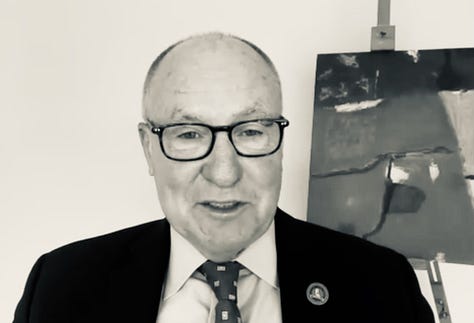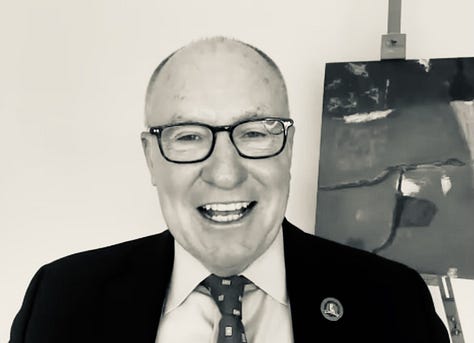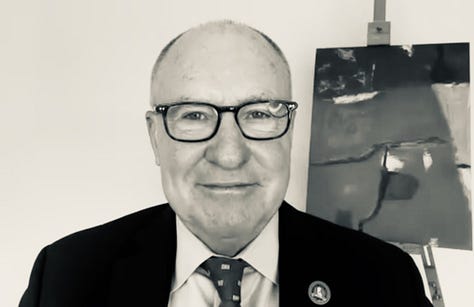Watch: Gregg's Sable Oil Pushback Bill Lands in Gov's Grand Bargain Enviro Deal
In the final hours of legislative session, Gregg Hart scored a big win in epic pipeline battle, passing his measure to require rogue oil company to undergo full Coastal Commission permit review.



On Friday, Gregg Hart, Santa Barbara’s man in the state Assembly, plans to fly to San Francisco to join Gov. Gavin Newsom for a ceremony celebrating the most sweeping environmental bill to emerge from the state Capitol this year.
Hart is responsible for one crucial element of the complex, compromise legislation known as Senate Bill 237: policy language that would bring order and clarity to the legal and political chaos fostered by the Sable Offshore oil company’s frenzied, hellbent drive to reopen an obsolete pipeline near Refugio State Beach that calamitously failed in 2014, triggering a $350 million environmental disaster.
“This really is an incredible story and it points to the fact that this company can’t be trusted,” Hart said. “Sable had an opportunity to do things the right way and they have chosen to do things the wrong way.”
Our story so far… To date, the Texas-based Sable outfit’s defiant and belligerent campaign to roll over community opposition to the pipeline restart has become entangled in a maze of hostilities with a host of state and local government elected bodies and administrative agencies, plus a small platoon of judges and jurists.
Now comes Hart with a measure that unequivocally and indubitably would require the company’s contentious project to obtain a permit from the California Coastal Commission, undergoing a comprehensive environmental review in the process.
“We need an umbrella organization or state agency that will look at the project in its entirety and really give it the rigorous environmental review that it needed,” he said in a Newsmakers TV interview on Thursday.
“The most obvious partner in this work is the California Coastal Commission,” Hart added. “This is what they do. They are prepared to evaluate a project like that, to take all the component parts, get the information. They have regular, transparent public meetings that the public can access.”
Sable has challenged the commission’s authority in the matter, arguing that a pipeine permit granted by the county decades ago is sufficient for them to operate now, shipping across the state oil drilled from platforms offshore.
“This is a different situation and a different time with a different project that deserves full environmental review,” Hart said of Sable’s argument. “So I introduced a bill that would really codify the existing law. The Coastal Commission has the authority to do this now, but it’s under dispute. Sable has contested that jurisdiction…So my bill simply clarified that jurisdictional authority for the Coastal Commission.”
Cap-and-trade bargaining chip. Although only in his second term, the 66-year old Democrat has emerged as an influential voice on environmental issues in Sacramento; his low-key, cogent manner and deep dive, wonky grasp of wooly policy details often places him around the ball on consequential legislation like the package Newsom signed Friday.
Although the Sable controversy is the most crucial and immediate concern to Santa Barbara, it actually is but one small moving part in a much-negotiated, cobbled-together package whose larger purpose is extending California’s cap-and-trade program, the state’s historic, market-based scheme for regulating greenhouse gases.
Perhaps the most controversial element of the legislation is that it authorizes up to 2,000 new state oil leases per year for the next 10 years in Kern County, the locus of petroleum production in California; Newsom, who earlier in his term had vowed to end all oil drilling in the state by 2045, made a major concession on the lease issue, much to the consternation of some environmental advocates.
Hart’s measure requiring a permit for Sable’s pipeline was originally contained in a separate Assembly bill, but became a bargaining chip in the negotiations over the grand compromise over cap-and-trade.
Six bucks a gallon?!? Hart acknowledged that pragmatic compromise clambered past aspirational purism in the political calculations of the milestone environmental bill, driven by concerns about the price at the pump of gas, along with other day-to-day cost of living matters affecting the constituents of elected officials.
“What we’re trying to avoid is gas prices going up,” he said. “And I think the only way we’re going to be successful is to work together…As long as people are still needing gasoline, we need to be providing that to them. But at the same time, we have to continue to be aggressive, and reduce demand and continue to meet our climate goals.
“Those things sound as though they’re in conflict, but really what we’re talking about is the process of change, and that doesn’t happen overnight. It happens thoughtfully and carefully, and that’s what we’re trying to accomplish.”
In our conversation, Assembly member Hart also:
Discussed the Trump Administration’s attack on California’s landmark climate and environmental regulations and practices, and the state’s response to it: “What the Trump Administration is doing is not based in fact, it’s not based in science - it’s based in ideology, and it is very destructive to California and other states that are trying to lead in this space, and it’s ultimately extremely expensive for consumers.”
Set forth the fundamental argument for Proposition 50, the sole measure on the Nov. 4 special election ballot, which would authorize the temporary redrawing of some congressional maps in California, in response to the gerrymandering of districts by Texas Republicans, as part of Trump’s effort to deny Democrats the chance to win the House in next year’s mid-terms. “What essentially this campaign boils down to is, if you want to stop the Trump Administration’s attacks on California, vote ‘yes’ on Proposition 50.”
Explained a batch of other bills he successfully passed through both houses, and which now are on the governor’s desk, including one that would require counties where the Sheriff is also the Coroner — like Santa Barbara — to employ independent medical examiners to investigate deaths of people who are in custody in county jail, a measure that was opposed by Sheriff Bill Brown. “Sheriff Brown said…this is a solution in search of a problem. I disagree.”
(This post was updated 20Sept25 to reflect Gov. Newsom’s formal signing of the environmental legislation that includes Hart’s Sable Oil measure).
Watch our full interview with Assembly member Gregg Hart via YouTube below or by clicking through this link. Our podcast is available on Apple, Spotify or on Soundcloud here. TVSB, Channel 17, airs “Newsmakers TV” every weekday at 5 p.m. and at 9 a.m. on weekends. KCSB, 91.9 FM, broadcasts the program Monday at 5:30 p.m.

